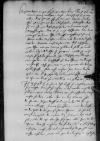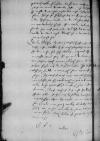Dem hochwirdigen in Got fursten und hern, hern ⌊Johan Dantisco⌋ / bischoff zu ⌊Kolmense⌋, ⌊koniglicher maiestet zu Polan⌋, peÿ ⌊romischer kayserlicher maiestet⌋ orator etc., meinem gnedigen herren
Hochwirdiger in Got furst, genediger herre. Nach erbittung meiner gantz willigen dinst / wunsch ich Ewer Gnaden vor allem / das jenige, / szo sy von Got begert. /
Darbey thue ich mich nach dem allerhochsten bedangken, das sÿ mir szo genediglich geschriben und meiner nicht vorgessen hat. / Das Ewer Gnaden nach bisher von hern ⌊doctor Wenzel⌋ und mir khein brieff entpfangen, / ist aus keiner andern ursachen, / alleine aus der unterlassen worden, / das wir nach unserm von ⌊Ach⌋ abschiden / gar khein, aber ya wenig pleibende stelle gehabt, alleine itzunder alhie zu ⌊Pragaw⌋. / Aldo ist auch unser hertzliber freundt her ⌊Nibschitz⌋ von ⌊koniglicher maiestet von Polen⌋ / in botshafft zu uns khomen, / und rast nach alhie alszo peÿ uns in gantz gutter bruderlicher geselleschafft. / Haben erst nechten peÿ uns in der canzeleÿ von Ewer Gnaden gesunds willen getrungken, / wilt, ... es thet ein lange zeit wirkung mit glug und hail. Ich schigk Ewer Gnaden hiemit dise brieffe zu. / Dieselbige wird sich wissen darnach zu richten. / Ich willet auch der selbigen gerne etwas newes von hinen schreiben, wosz nichts sonders, / allein den 12 ditz monats ist der ⌊her von Rogendorff⌋ und auch andre ⌊romischer koniglicher maiestet⌋, meines allergnedigsten herrens, comissarien / mit dem ⌊Lasken⌋ under Pleidenburgen zu samen khomen / zu handeln, wasterley gestalt der anstant dicz jars gehalten werden sol. / ⌊Romische konigliche maiestet⌋ bemuhet sich peÿ allen iren underthanen, / das sÿ in zeiten des frides etwas fruchtbars ausrichten mocht. / Es wil auch warlich die grosse not turfft erfordern. / Wen aber Got der almechtig die erstlichen ⌊potentaten⌋ wollet irleuchten, / das sy uns, / welhs wir ... gleich im maul der veinden stehen, / nicht vorlisse[n], szo mochte der gantzen cristenheit nicht bessers wid[er]faren. / Sunst ist zubesorgen, das ein konigreich nach ... andern scheittern wirdt, / wo der almechtige ... ein wunderbarlich zeichen thuen wirdt, / wolt Gote, i[n]samlet peÿ ouch gros gelt / und list, das ein mal widder den veind ⌊Cristi⌋ klingen ist in der warheit hoe und grose zeit.
Der her ⌊Nibschitz⌋, / als ich nicht vorseh, zeucht nach in etli... tagen nicht. / Wollen Ewer Gnaden nach samptlich mit ein a... schreiben etc. ⌊Her⌋ helt sich warlich gantz wol alhie. / Is[t] in grosser gnad peÿ ⌊koniglicher maiestet⌋ und den herren, / he... vor etlichen tagen meinem allergnedigsten herren / die n... geborner fursten aus der taufe gehoben, / ist derzeit... vleissiger handler / in meins gnedigen herren margraff i... sachen. / Ich vorsich mich nach, wie wol sy sich ge... gar geslossen hat, / sy werde nach ein gut ende nemen. Allein der her margraff ist ein wenig ye zu hart in seinem furnemen. / Sunst wiss ich Ewer Gnaden nicht sonders zu schreiben, alleine ich thue Euch derselbigen treulich bevele[n] mit vleissigen beger, sy wollet meinem lieben br[uder] hern Cornelio mein gantz willige bruderliche dinst zeigen, / wen es ime mit allen den seinen wol ginge, mir ein freudt.


